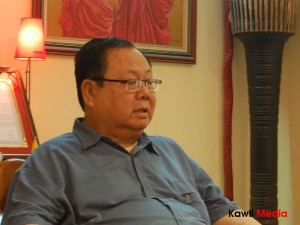He may not be Shan’s answer to Aung San Suu Kyi, but Hkun Tun Oo, who is scheduled to fly quietly into Bangkok for a full medical checkup today, is already on hundreds of Facebooks. Shan migrant community has already been alerted to stage a hearty welcome for him at Suvarnabhumi airport this evening, according to sources.
 “That’s the curse of being popular,” said a friend in Bangkok. “But at least only a few will know where he is putting up and getting treatment.”
“That’s the curse of being popular,” said a friend in Bangkok. “But at least only a few will know where he is putting up and getting treatment.”
Hkun Tun Oo, who will be 69 come 11 September, is suffering from overweight and physical disorders accompanying it. “He will also be in need of a solitary confinement to recuperate both his physical and spiritual well-being,” said the friend. “But I’m sure he will want to meet all of them before he returns home.”
Known as Noel to his schoolmates, he is a son of Sao Kya Zone, elder brother of Hsipaw’s last ruling prince Sao Kya Seng, who was detained and disappeared following the 1962 coup.
His Shan Nationalities League for Democracy (SNLD) emerged as the second largest winning party nationwide and the largest statewide in the 1990 general elections.
Like Aung San Suu Kyi’s National league for Democracy (NLD), the ruling military council refused to hand over power to his party.
He is known as a “unionist” among Shans and is not quite popular among those who are for nothing less than Shan State Independence. But that didn’t save him from being arrested and sentenced to 93 years imprisonment for treason in 2005.
He and his colleagues were released on 13 January on general amnesty ordered by President Thein Sein, together with other well-known political prisoners like Min Ko Naing and Ashin Gambira.
His SNLD was re-registered on 12 June, 5 months after his release.
He was due to visit the United States earlier this month to receive the Democracy award. But the long-awaited passport was given to him 25 June, only after the sectarian violence in Arakan State was under control, according to his close associates.


